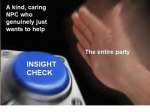TheCosmicKid
Hero
I think you're overthinking this. Why twist the question into the form of an action?Yeah, that’s a perfectly valid way to do it, and probably more in line with the RAI. Personally, I’m not a fan of the verbal gymnastics of describing “try to see if someone is lying” as an action. It’s the same as “I think back to my arcane studies to see if I remember anything about these runes.” Its an awkward sentence because you’re trying to describe an automatic mental reflex like memory as an action, and ultimately doesn’t give me any more information about the character’s approach than simply asking to make an Insight check or Arcana check, respectively. I prefer to handle the question of “do I know/notice [thing]?” with a passive check rather than asking players to twist those questions into the form of an action just to avoid having them ask to make a [skill used to notice thing] check.
"Is he lying?"
"Make an Insight check."
"Is there a bad guy hiding in the room?"
"Make a Perception check."
No big deal.


